Abstract
Monoclonal antibody 791 (XMMCO-791) recognizes a colorectal tumour-associated antigen. Antibody 791-ricin A chain immunotoxin (XMMCO-791-RTA) inhibits growth of human tumour xenografts and it is therefore being evaluated for the treatment of colorectal cancer. One of the problems with therapy with mouse monoclonal antibodies is they stimulate humoral responses in patients. However antigens linked to ricin are cytotoxic for B cells and therefore XMMCO-791-RTA may not be immunogenic. The humoral antibody response to murine monoclonal antibody XMMCO-791 (IgG2b) conjugated to the plant toxin, ricin A chain (RTA), was measured in colorectal cancer patients in a phase I clinical trial. All patients produced strong responses to the XMMCO-791 immunoglobulin and to RTA. The predominant response to the antibody was against the idiotypic determinant although anti-subclass and anti-mouse antibodies were also detected. A component of the anti-idiotypic immunoglobulin response in the colorectal cancer patients was directed against the combining site of XMMCO-791. These antibodies inhibited in-vitro binding of XMMCO-791 to target 791 cells and so may be inhibitors of repeated immunotoxin therapy. Immunotoxins do not abrogate the immune response to mouse immunoglobulin in vivo but instead are highly immunogenic.
Full text
PDF
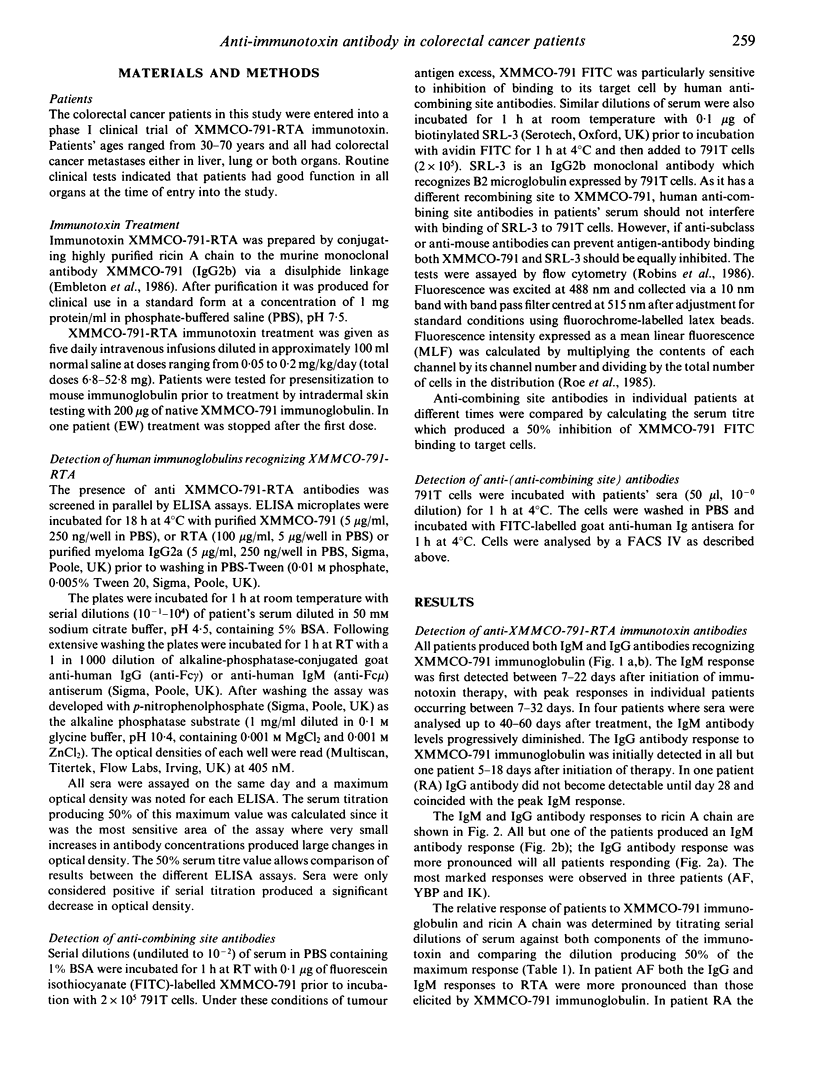
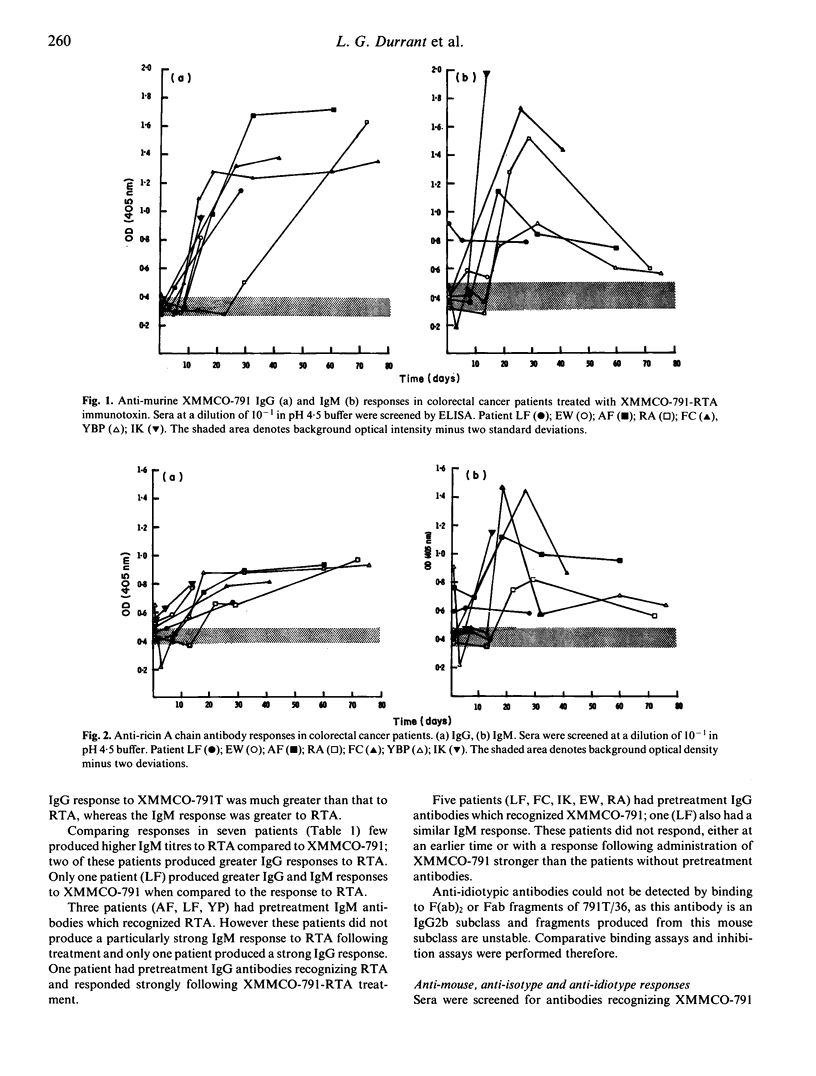
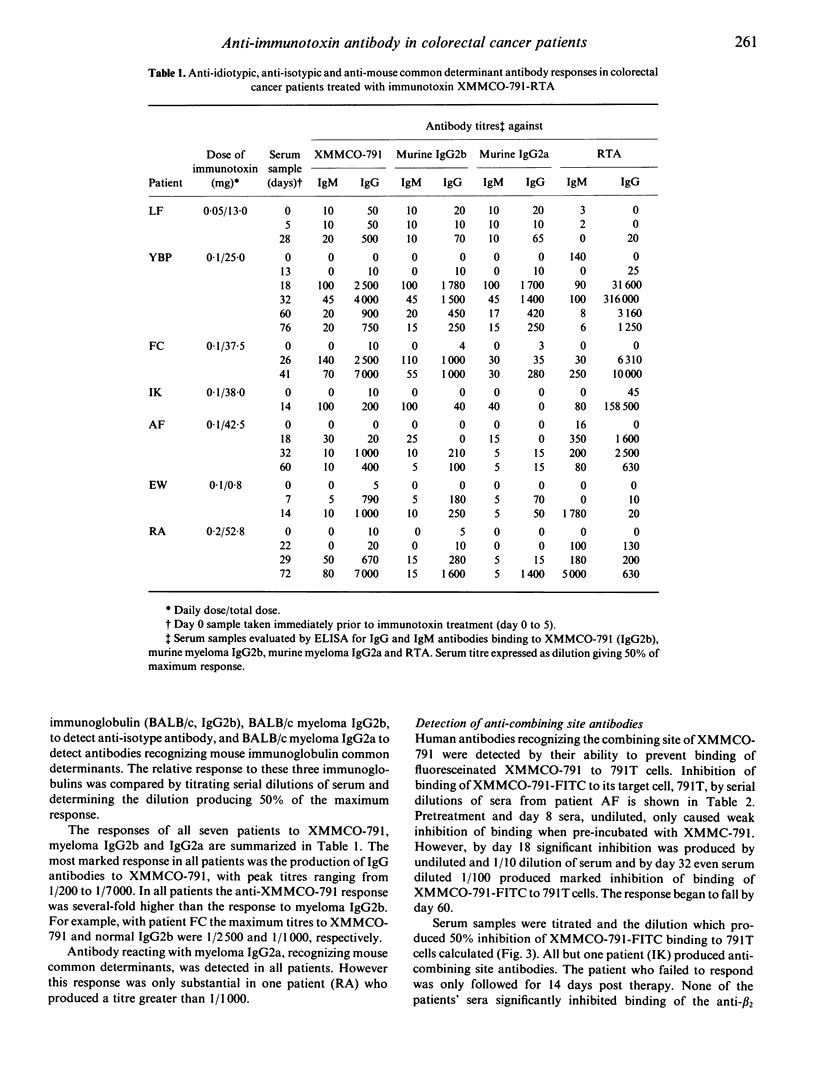
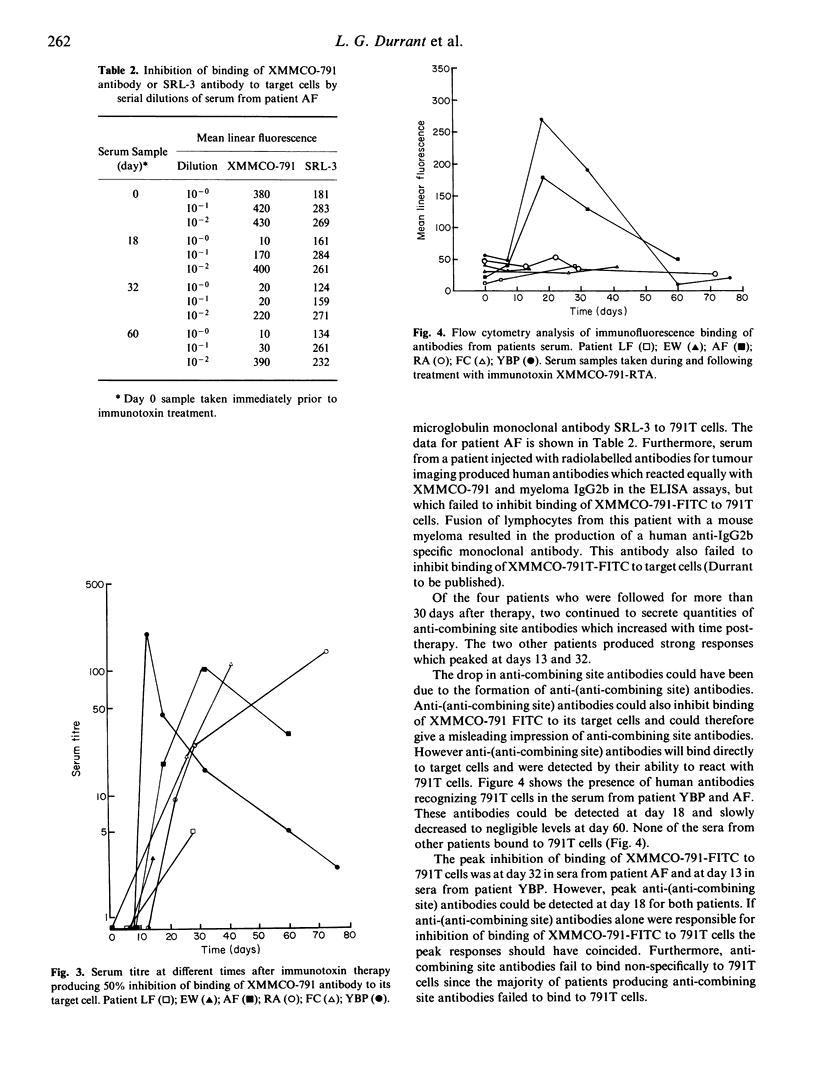
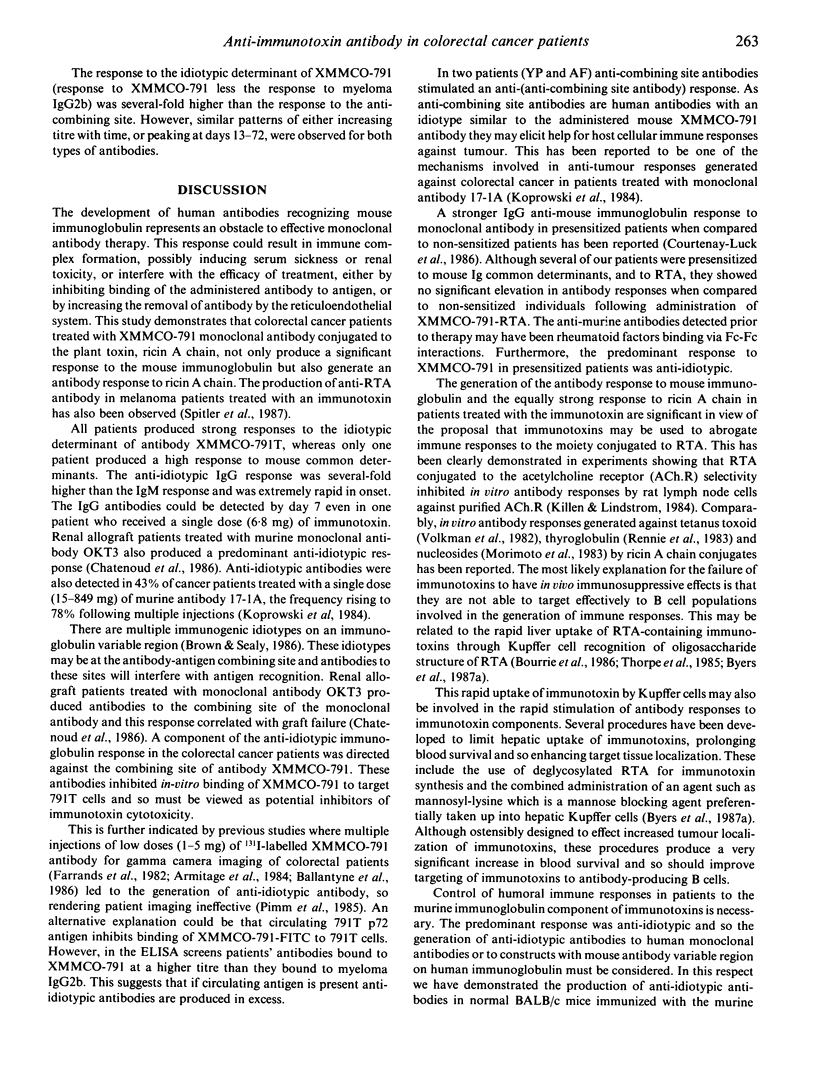
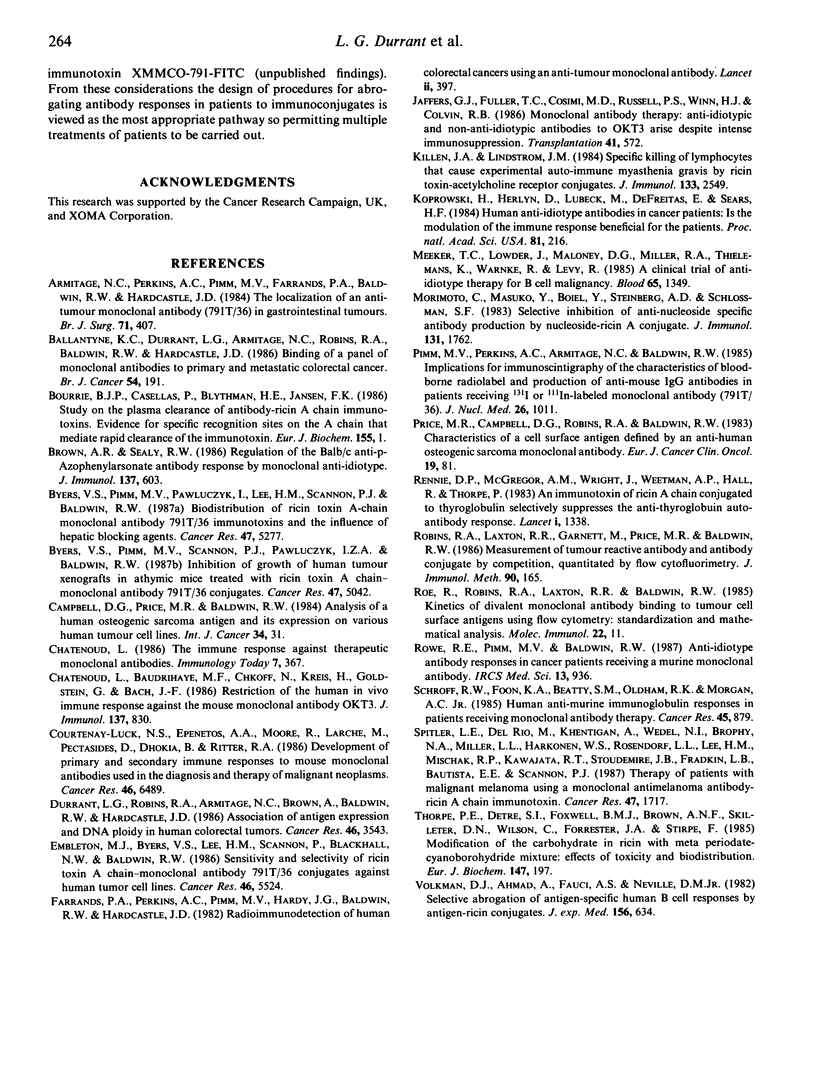
Selected References
These references are in PubMed. This may not be the complete list of references from this article.
- Armitage N. C., Perkins A. C., Pimm M. V., Farrands P. A., Baldwin R. W., Hardcastle J. D. The localization of an anti-tumour monoclonal antibody (791T/36) in gastrointestinal tumours. Br J Surg. 1984 Jun;71(6):407–412. doi: 10.1002/bjs.1800710602. [DOI] [PubMed] [Google Scholar]
- Bourrie B. J., Casellas P., Blythman H. E., Jansen F. K. Study of the plasma clearance of antibody--ricin-A-chain immunotoxins. Evidence for specific recognition sites on the A chain that mediate rapid clearance of the immunotoxin. Eur J Biochem. 1986 Feb 17;155(1):1–10. doi: 10.1111/j.1432-1033.1986.tb09451.x. [DOI] [PubMed] [Google Scholar]
- Brown A. R., Sealy R. E. Regulation of the BALB/c anti-p-azophenylarsonate antibody response by monoclonal anti-idiotype. I. Anti-idiotope fine specificity. J Immunol. 1986 Jul 15;137(2):603–609. [PubMed] [Google Scholar]
- Byers V. S., Pimm M. V., Pawluczyk I. Z., Lee H. M., Scannon P. J., Baldwin R. W. Biodistribution of ricin toxin A chain-monoclonal antibody 791T/36 immunotoxin and influence of hepatic blocking agents. Cancer Res. 1987 Oct 15;47(20):5277–5283. [PubMed] [Google Scholar]
- Byers V. S., Pimm M. V., Scannon P. J., Pawluczyk I., Baldwin R. W. Inhibition of growth of human tumor xenografts in athymic mice treated with ricin toxin A chain-monoclonal antibody 791T/36 conjugates. Cancer Res. 1987 Oct 1;47(19):5042–5046. [PubMed] [Google Scholar]
- Campbell D. G., Price M. R., Baldwin R. W. Analysis of a human osteogenic sarcoma antigen and its expression on various human tumour cell lines. Int J Cancer. 1984 Jul 15;34(1):31–37. doi: 10.1002/ijc.2910340107. [DOI] [PubMed] [Google Scholar]
- Chatenoud L., Baudrihaye M. F., Chkoff N., Kreis H., Goldstein G., Bach J. F. Restriction of the human in vivo immune response against the mouse monoclonal antibody OKT3. J Immunol. 1986 Aug 1;137(3):830–838. [PubMed] [Google Scholar]
- Courtenay-Luck N. S., Epenetos A. A., Moore R., Larche M., Pectasides D., Dhokia B., Ritter M. A. Development of primary and secondary immune responses to mouse monoclonal antibodies used in the diagnosis and therapy of malignant neoplasms. Cancer Res. 1986 Dec;46(12 Pt 1):6489–6493. [PubMed] [Google Scholar]
- Durrant L. G., Robins R. A., Armitage N. C., Brown A., Baldwin R. W., Hardcastle J. D. Association of antigen expression and DNA ploidy in human colorectal tumors. Cancer Res. 1986 Jul;46(7):3543–3549. [PubMed] [Google Scholar]
- Embleton M. J., Byers V. S., Lee H. M., Scannon P., Blackhall N. W., Baldwin R. W. Sensitivity and selectivity of ricin toxin A chain-monoclonal antibody 791T/36 conjugates against human tumor cell lines. Cancer Res. 1986 Nov;46(11):5524–5528. [PubMed] [Google Scholar]
- Farrands P. A., Perkins A. C., Pimm M. V., Embleton M. J., Hardy J. D., Baldwin R. W., Hardcastle J. D. Radioimmunodetection of human colorectal cancers by an anti-tumour monoclonal antibody. Lancet. 1982 Aug 21;2(8295):397–400. doi: 10.1016/s0140-6736(82)90437-8. [DOI] [PubMed] [Google Scholar]
- Jaffers G. J., Fuller T. C., Cosimi A. B., Russell P. S., Winn H. J., Colvin R. B. Monoclonal antibody therapy. Anti-idiotypic and non-anti-idiotypic antibodies to OKT3 arising despite intense immunosuppression. Transplantation. 1986 May;41(5):572–578. doi: 10.1097/00007890-198605000-00004. [DOI] [PubMed] [Google Scholar]
- Killen J. A., Lindstrom J. M. Specific killing of lymphocytes that cause experimental autoimmune myasthenia gravis by ricin toxin-acetylcholine receptor conjugates. J Immunol. 1984 Nov;133(5):2549–2553. [PubMed] [Google Scholar]
- Koprowski H., Herlyn D., Lubeck M., DeFreitas E., Sears H. F. Human anti-idiotype antibodies in cancer patients: Is the modulation of the immune response beneficial for the patient? Proc Natl Acad Sci U S A. 1984 Jan;81(1):216–219. doi: 10.1073/pnas.81.1.216. [DOI] [PMC free article] [PubMed] [Google Scholar]
- Meeker T. C., Lowder J., Maloney D. G., Miller R. A., Thielemans K., Warnke R., Levy R. A clinical trial of anti-idiotype therapy for B cell malignancy. Blood. 1985 Jun;65(6):1349–1363. [PubMed] [Google Scholar]
- Morimoto C., Masuho Y., Borel Y., Steinberg A. D., Schlossman S. F. Selective inhibition of anti-nucleoside-specific antibody production by nucleoside-ricin A conjugate. J Immunol. 1983 Oct;131(4):1762–1764. [PubMed] [Google Scholar]
- Pimm M. V., Perkins A. C., Armitage N. C., Baldwin R. W. The characteristics of blood-borne radiolabels and the effect of anti-mouse IgG antibodies on localization of radiolabeled monoclonal antibody in cancer patients. J Nucl Med. 1985 Sep;26(9):1011–1023. [PubMed] [Google Scholar]
- Price M. R., Campbell D. G., Robins R. A., Baldwin R. W. Characteristics of a cell surface antigen defined by an anti-human osteogenic sarcoma monoclonal antibody. Eur J Cancer Clin Oncol. 1983 Jan;19(1):81–90. doi: 10.1016/0277-5379(83)90402-9. [DOI] [PubMed] [Google Scholar]
- Rennie D. P., McGregor A. M., Wright J., Weetman A. P., Hall R., Thorpe P. An immunotoxin of ricin A chain conjugated to thyroglobulin selectively suppresses the antithyroglobulin autoantibody response. Lancet. 1983 Dec 10;2(8363):1338–1340. doi: 10.1016/s0140-6736(83)91094-2. [DOI] [PubMed] [Google Scholar]
- Robins R. A., Laxton R. R., Garnett M., Price M. R., Baldwin R. W. Measurement of tumour reactive antibody and antibody conjugate by competition, quantitated by flow cytofluorimetry. J Immunol Methods. 1986 Jun 24;90(2):165–172. doi: 10.1016/0022-1759(86)90072-4. [DOI] [PubMed] [Google Scholar]
- Roe R., Robins R. A., Laxton R. R., Baldwin R. W. Kinetics of divalent monoclonal antibody binding to tumour cell surface antigens using flow cytometry: standardization and mathematical analysis. Mol Immunol. 1985 Jan;22(1):11–21. doi: 10.1016/0161-5890(85)90029-x. [DOI] [PubMed] [Google Scholar]
- Schroff R. W., Foon K. A., Beatty S. M., Oldham R. K., Morgan A. C., Jr Human anti-murine immunoglobulin responses in patients receiving monoclonal antibody therapy. Cancer Res. 1985 Feb;45(2):879–885. [PubMed] [Google Scholar]
- Spitler L. E., del Rio M., Khentigan A., Wedel N. I., Brophy N. A., Miller L. L., Harkonen W. S., Rosendorf L. L., Lee H. M., Mischak R. P. Therapy of patients with malignant melanoma using a monoclonal antimelanoma antibody-ricin A chain immunotoxin. Cancer Res. 1987 Mar 15;47(6):1717–1723. [PubMed] [Google Scholar]
- Thorpe P. E., Detre S. I., Foxwell B. M., Brown A. N., Skilleter D. N., Wilson G., Forrester J. A., Stirpe F. Modification of the carbohydrate in ricin with metaperiodate-cyanoborohydride mixtures. Effects on toxicity and in vivo distribution. Eur J Biochem. 1985 Feb 15;147(1):197–206. doi: 10.1111/j.1432-1033.1985.tb08737.x. [DOI] [PubMed] [Google Scholar]
- Volkman D. J., Ahmad A., Fauci A. S., Neville D. M., Jr Selective abrogation of antigen-specific human B cell responses by antigen-ricin conjugates. J Exp Med. 1982 Aug 1;156(2):634–639. doi: 10.1084/jem.156.2.634. [DOI] [PMC free article] [PubMed] [Google Scholar]
- Willox J. C., McAllister E. J., Sangster G., Kaye S. B. Effects of magnesium supplementation in testicular cancer patients receiving cis-platin: a randomised trial. Br J Cancer. 1986 Jul;54(1):19–23. doi: 10.1038/bjc.1986.147. [DOI] [PMC free article] [PubMed] [Google Scholar]


